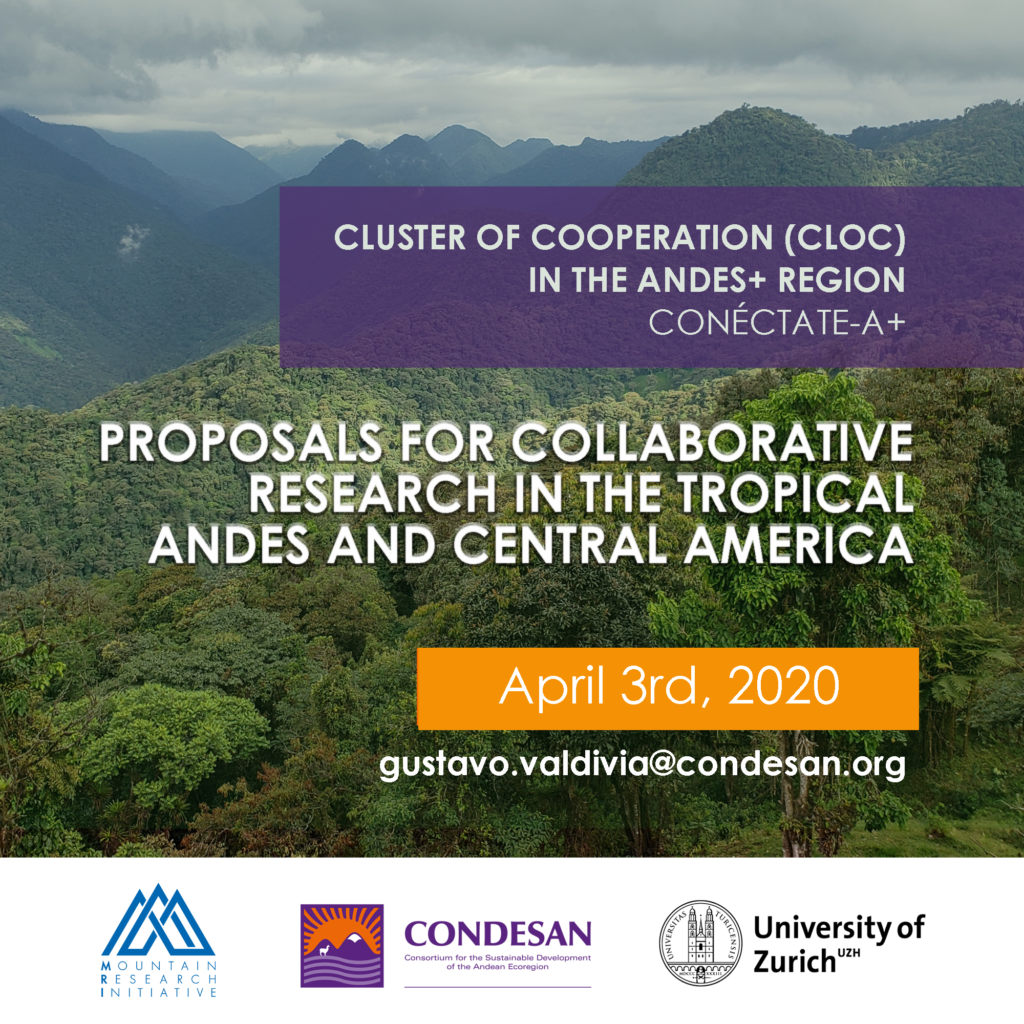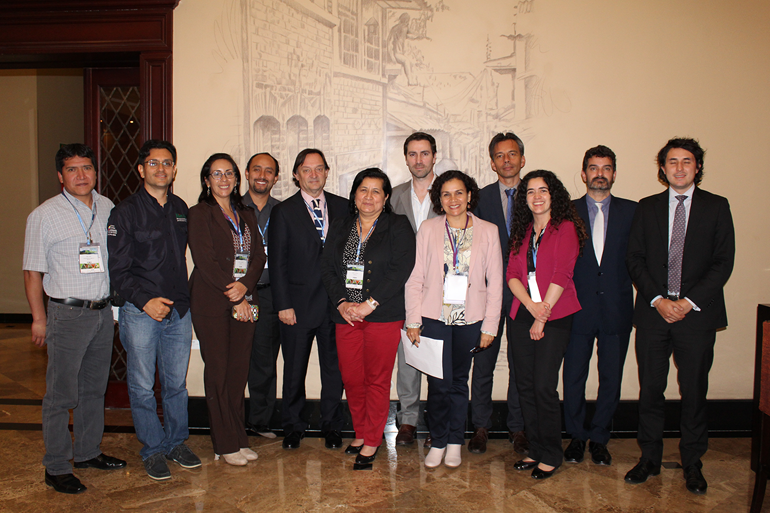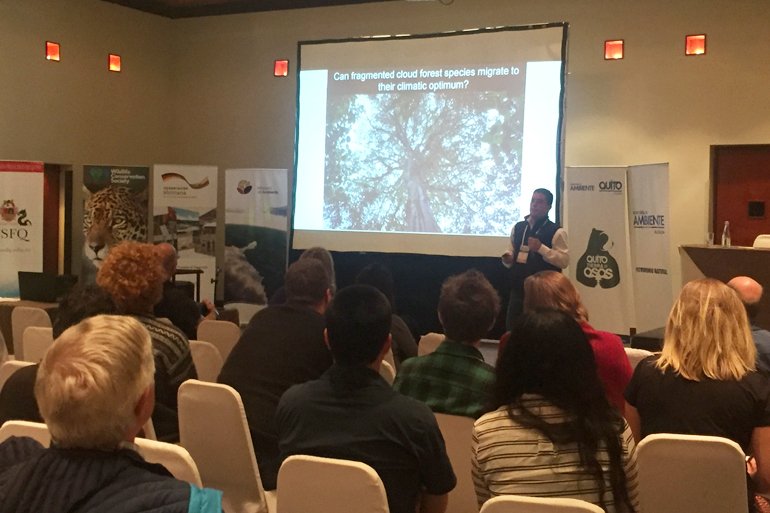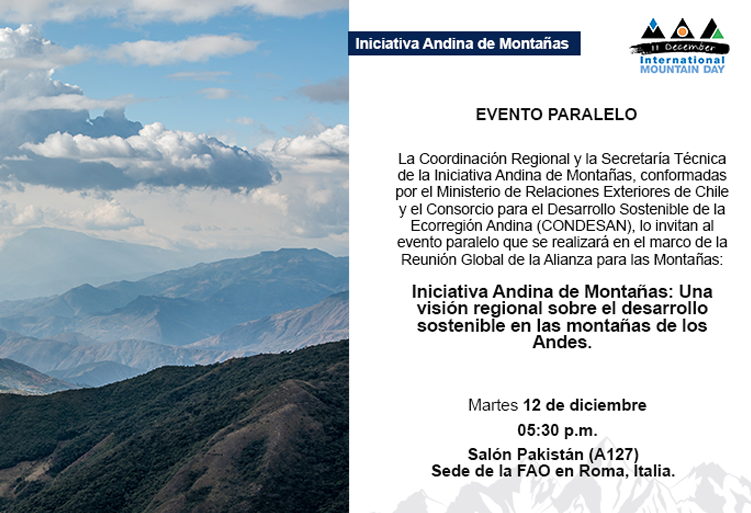![]()
Call for small grant proposals
[trx_button type=”square” style=”default” size=”medium” color=”#FFFFFF” bg_color=”#6A0C79″ link=” https://condesan.org/wp-content/uploads/2020/02/CLOC-Small-Grants-Proposal_V2-final_ENG-15MAR2020-1.docx” popup=”no” top=”inherit” bottom=”inherit” left=”inherit” right=”inherit”]Downloadable version[/trx_button]
1. Background
Achieving the 2030 Agenda through the 17 Sustainable Development Goals (SDGs) requires, among other elements, the mobilization of expertise, financial resources, and political will – across scales at the global, national and local levels — to transform the economic, social, and environmental aspects of sustainable development (United Nations, 2015). An important recent body of evidence points to a need for “transformations” (Sachs et al., 2019; Messerli et al., 2019) or, more precisely, deep structural changes across different sectors in society to reach the 2030 Agenda. These domains include, among others: a) the (re)distribution of natural, economic and political resources at different scales (Gupta and Vegelin, 2016; Newell et al., 2018); b) a significative improvement in health and sanitation services (World Health Organization, 2019; FAO et al., 2018); c) the deep transformation of food and energy systems (FAO, 2019; Willett et al., 2019; Sachs et al., 2019); and c) the integration of climate action across the SDGs to equitably address the impacts of climate change on social and ecological systems (Fuso Nerini et al., 2019; TWI2050, 2018).
In certain discussions, the SDGs are presented as comprehensive in their multiple targets and goals, and designed to be addressed synergistically as trade-offs (Pradhan et al., 2017). However, although many countries have started to develop policies, laws, and plans to achieve the SDGs, there is a lack of evidence on just how the SDGs should be operationalized on the ground to achieve the overarching scope and goals of the SDGs (Liu et al., 2018; Liverman, 2018). Moreover, a rapidly expanding body of evidence signals that some trade-offs and conflicts are apparent when facing the design and implementation of actions aimed at attaining multiple SDGs (Kroll et al., 2019; Stafford-Smith et al., 2017; Breuer et al., 2019; Amos and Lydgate, 2019), and, specifically, in the Global South (Mainali et al., 2018; Nilsson et al., 2016; Newell et al., 2018; Cohen, 2019).
Consistent with the multidimensional view embodied in the SDGs, rather than “siloed” research on specific topics, more efforts to methodologically integrate evidence from the natural sciences, engineering, and the social sciences/humanities are needed (Fuso Nerini et al., 2019; Horan, 2019). Additionally, it is key to articulate political, cultural, social and economic dimensions in the process of scientific investigation aimed at advancing our understanding of the complex dynamics at play when implementing the SDGs (Horton and Brown, 2018; Hummel et al., 2017; Game et al., 2018).
In this context, Conéctate A+[1] is calling for proposals for collaborative research activities that contribute to the elaboration of synthesis reports, case studies, or meta-analyses that explore the contemporary challenges for effective and equitable science-informed decision-making that contributes to the implementation of the SDGs in the Andes+ region[2]. Conéctate A+ will be awarding small grants for 2 to 3 outstanding proposals that meet the eligibility criteria of this call.
[1] The Cluster of Cooperation (CLOC) in the Andes+ region Conéctate A+ aims to develop an innovative and trans-national research network for interdisciplinary discussion on societal challenges related to the interactions of global sustainability, ecosystems, health and climate change. Through this process, we aim to contribute to convening dialogues and strengthening capacities to facilitate associations between researchers and users of research findings.
[2] In the context of the Conéctate A+ CLOC, the Andes + region covers the Tropical Andes and Central America.
2. High priority themes for funding
This call seeks interdisciplinary collaborations that can critically conceptualize, analyse, and explain, how science and policy interact in practice across the domains of human health, ecosystems and climate change, and their interaction, to contribute to a more coherent, effective, and equitable implementation of SDG-oriented policies in the Andes+ region.
We encourage proposals that can provide original insights from case studies, meta-analysis, or systematic reviews, that shows the interactions of at least two of these topics, with a regional focus. Among other topics, submissions might consider an in-depth critical analysis of:
- Multi-sector and multi-scale studies that provide conceptual and/or empirical insights to understand the challenges of SDG implementation and that account for trade-offs and synergies between and within the SDGs domains and targets, including inequalities concerning the progress made, and the capacities of States and other stakeholders for maximizing the synergies and in addressing trade-offs.
- The role of current governance models and arrangements, at the global, transboundary regional, national and/or local levels, in the implementation process and outcomes of the SDGs, including the relationship between socio-ecological and political inequalities, global sustainability agendas, and the role of diverse interpretations of ‘‘sustainability’’, environmental governance systems, and power dynamics across stakeholders, scales and territories in policy outcomes.
- Dynamics between science/knowledge systems, science advisory mechanisms, scientists and decisionmakers at the global, national and local levels and their role in decision-making and solution-building with emphasis on the links between climate change, human health and ecosystems.
3. Eligibility and selection criteria
To be eligible to receive support from Conéctate A+, proposals must:
- Be from a consortium with at least one Conéctate A+ partner institution located in the Andes+ region and at least one institution that is not affiliated to Conéctate A+ and located in the Andes+ region (proposals that additionally include a Swiss-based Conéctate A+ partner institution will receive a 3 points bonus in the final evaluation);
- Have an interdisciplinary research team with substantial research experience in the proposed topics (inclusion of early career researchers is highly encouraged);
- Be thematically focused on the triple nexus between ecosystems, health, and global environmental change across disciplinary, sectorial, and geographic boundaries in the Andes+ region;
- Demonstrate policy relevance and how the expected results and outcomes will benefit and enhance science-informed policy and decision-making in the Andes+ region;
Proposals that meet the eligibility criteria will advance to the evaluation stage, in which a scoring system of up to 50 points is possible. An evaluation committee, representative of the 3 CLOC facilitating organizations, will carry out the evaluation following these criteria:
| Evaluation criteria | Points |
| 1. Clarity and significance of the problem description | 0 – 10 |
| 2. Consistency between the problem and theoretical framework | 0 – 10 |
| 3. Feasibility of the methodological design | 0 – 10 |
| 4. Potential policy relevance and impact | 0 – 10 |
| 5. Multidisciplinary expertise/experience of the research team | 0 – 10 |
| 6. Bonus 1: The proposal creates or sustains a solid relationship between Conéctate A+ CLOC member institutions in the Andes+ region and at least one Swiss Conéctate A+ CLOC member institution. | 0 – 3 |
| 7. Bonus 2: The proposal includes at least one early career researcher (graduate student or recent PhD graduate with no more than 5 years since graduation) in the research team. | 3 |
By submitting an application, applicants confirm their ability and commitment to complete a synthesis report within 8 months once the funds have been awarded. Synthesis reports are expected to: a) elaborate a comprehensive overview of the academic debate on the effectiveness and efficiency of science–policy interactions (as it is presented in relevant scientific and grey literature, websites, international policy documents, declarations, conferences, and other similar sources); b) provide empirical and theoretical insights into the information and evidence that is currently available on how these topics are interrelated in the Andes+ region; and c) identify what other lines of research are required. Additionally, selected applicants will be required to d) provide a detailed report of the outcomes of the research activities funded with the awarded grant.
The research team in charge of the selected proposals will also lead 2 online workshops on the Conéctate A+ virtual platform. The first one, in April 2020, will focus on a discussion on the methodological strategy for the elaboration of the synthesis report. In the second virtual workshop, in August 2020, the research team will present a first manuscript draft for discussion with the rest of the CLOC members. These virtual workshops can be conducted in English or Spanish.
Selected proposals will receive funding of up to 12.000 USD to cover the following types of expenses: co-financing salaries of early career researchers and students involved in the project, travel and fieldwork costs, and workshop organization. These funds are intended to enable researchers to conduct and publish the proposed research in a scientific journal, or as a policy brief, or other format agreed with prior consultation with Conéctate A+ that are targeted at a broader audiences such as the general public, practitioners, officials from public agencies, among others. The funding cannot be used to cover overhead costs for the organizing entity, vehicle purchases, conference travel costs or fees, or for the purchase or installation of equipment or infrastructure.
Conéctate A+ will accept proposals, reports and other requested deliverables written in English and Spanish.
4. Application details and deadline
Send an application (1500 – 2000 words) summarizing the following:
- The main problem(s) to be addressed to move forward the 2030 Agenda in the Andes+ region taking into account the linkages between climate change, ecosystems, and human health.
- An overview of the research questions to be addressed in the synthesis report
- Research approach or proposed methods for the synthesis report
- An eight-month work plan and budget, in which the proposed research initiatives and activities are specified. The work plan should elaborate on how the proposed activities will contribute to sustain an active and synergic collaboration between the selected institutions and the project team members. The budget should detail the amount requested to Conéctate A+ and other complementary institutional contributions.
- A 2-page CV for each team member, attached as Word or PDF documents.
Submit your proposal by email to gustavo.valdivia@condesan.org with the lead applicant’s name and the title of the proposal in the subject of the email. Submission deadline: 17:00 (-5 GMT) March 27, 2020.
[trx_button type=”square” style=”default” size=”medium” color=”#FFFFFF” bg_color=”#6A0C79″ link=”https://condesan.org/wp-content/uploads/2020/02/Proposal-template_ENG_VF-1.docx” popup=”no” top=”inherit” bottom=”inherit” left=”inherit” right=”inherit”]Proposal template[/trx_button]
[trx_button type=”square” style=”default” size=”medium” color=”#FFFFFF” bg_color=”#6A0C79″ link=”https://condesan.org/wp-content/uploads/2020/02/CLOC-Grant-Work-Plan-Budget-1.xlsx” popup=”no” top=”inherit” bottom=”inherit” left=”inherit” right=”inherit”]WP Budget Template[/trx_button]
5. Timeline
- Proposals Due: 17:00 EST (-5 GMT), 3 April 2020 (new extended deadline)
- Proposals Review: 4 – 16 April 2020
- Grant award notification: 17 April 2020
- Synthesis report first draft Due: 16 October 2020
- Synthesis report final draft: 15 January 2020
6. Inquiries
Gustavo Valdivia
CONDESAN – Peru
gustavo.valdivia@condesan.org
+51 1 6189400





